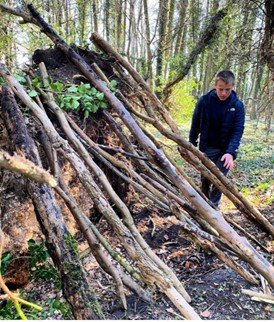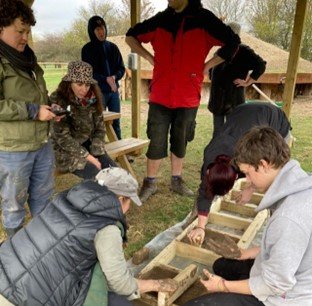Guest Blog: Rewilding Youth
by Dr. Charlotte Dean
All photo credits: Rewilding Youth
Rewilding Youth is a not-for-profit community interest company based on East Hull Community Farm in Hull. It was established in November 2021 by University of Hull lecturer and researcher Dr Charlotte Dean and Outdoor Youth Worker Les Moss who are both passionate about their mission to create opportunities for young people in Hull to connect with the outdoor spaces around them. They hope these connections will inspire them to engage actively with the environment, whether that be through feeling confident to spend more time outdoors or aspiring to working in associated jobs, such as outdoor youth work, rewilding initiatives, arboriculture, green woodwork and conservation.
Working in partnership with Probe Hull Ltd, Hull City Council, Trees for Cities and the Job Centre’s Kickstart scheme (which aimed to get unemployed people aged between 18 and 24 into work), Rewilding Youth advertised for nine young people to sign up for a six-month fully paid apprenticeship scheme. Through this scheme they would receive training in skills such as tree planting, bushcraft, employability, conservation and green woodwork with a view to enabling them to achieve inspiring and rewarding careers that enhance the great outdoors.
Hull City Council is supporting the programme through training the new recruits in tree planting skills, and Probe Hull Ltd provides weekly sessions on employability skills, CV writing and help with progression onto future career paths. The young people supported Rewilding Youth in helping to deliver the council’s Trees for Cities programme of planting 30,000 trees across Hull and also helped to build a traditional wood and cob roundhouse in their Rewilding Space, which is situated on the outskirts of the farm.
The Rewilding Space is used every day by different groups of young people and is a safe space where they can explore and develop the skills that we feel really connect them to nature and the environment. The young people are encouraged to build, to climb, to shout, to run wild and also to stop, and to sit and listen or watch the natural world unfold before them. We like to string a few hammocks up around the space for young people to do just this!
Connor Waudby, aged 19, from the Spring Bank area in Hull has previously been employed as a factory worker and at a local shipyard, but did not feel engaged in the work he was doing. He knew he wanted to do something else but had no idea what. When he saw the advertisement for the Rewilding Youth Kickstart programme at the Job Centre, he said he was particularly interested in the opportunity to learn skills that would equip him to work outside.
He says: “I started on the scheme in December and have already learned so much. It is amazing to be working outside and to understand how many interesting jobs this could lead to, which I had no idea about before.”
“The best thing of all is the sense of achievement you get when you’re giving something back to the community by planting trees and working with groups of young people who have never previously spent much time outside. I have definitely been inspired to develop the skills I need to carry on with this kind of work after the scheme has finished.”
The project is supported by a talented team, including outdoor education practitioners; youth workers and therapists. Activities offered to young people include fire-lighting, shelter-building, natural crafts, green woodwork, campfire cooking and lots more – all underpinned with the principles and theories of Wild Pedagogy and Wild Therapy (find out more about these below).
Rewilding Youth work predominantly with young people who find it difficult to engage with learning in a school setting and may be excluded or educated in a different way. These young people often present challenging behaviours within a classroom environment and may have been diagnosed with ADHD or other neurodiversities. Rewilding Youth find that engaging these young people in some of the activities they offer along with nature connection experiences is truly transformative.
“We work on the principles of self-directed education and find that when young people, who may find the rules and regulations at school difficult to adhere to, are offered choices and freedom in a space that is not contained, they really do flourish.” says Dr. Dean from University of Hull, who goes on to say that:
“Young people, especially those living in urban areas, are often discouraged from spending time outside due to parental fears of getting involved in ‘anti-social’ behaviour, stranger danger and an assumption that outdoor spaces in Hull are unsafe. We work hard to try and reassure parents and young people that through learning about the wildlife, plants and ecosystems that surround us, we can start to feel a sense of belonging and ultimately responsibility for the natural world on our doorsteps.”
One of the ways that Rewilding Youth is finding particularly effective in connecting families and young people to the environment is through literally building with it! Their Rewilding Space has been developed through grants from the Youth Investment Fund, Trees for Cities and the Green Influencers programme.
Rewilding Youth have also forged a strong partnership with EBUKI (Earth Building UK and Ireland) along with a nationwide community of earth-building practitioners to bring workshops and courses to Hull in traditional clay plastering using wattle and daub, adobe brick-making and green woodworking. Graham Johnson of Beverley-based Eco Services has been working in this area for a long time and has been instrumental in helping Rewilding Youth build these connections through his work nationally and internationally in this field.
Rewilding Youth is currently seeking funding to continue with their work and is also promoting their Rewilding Schools programme as a potential funding stream.
The Rewilding Schools Programme is aimed at developing a long-term sustainable solution to providing nature connection opportunities within the school setting through providing them with the infrastructure, training and support for schools to offer ‘rewilding’ opportunities to their students on their own site.
We work with the school to identify an area within the grounds that could be designated as a ‘Rewilding Space’. This may be part of the school field or perhaps an area that is currently covered in concrete or tarmac (yes, we can rewild anything!). We then work with the students to design a natural ‘wild’ space which is youth-led and tailored to meet the needs of the young people who will use it.
The students are also introduced to a wide variety of ‘bush craft’ skills such as campfire cooking, fire-lighting, foraging, shelter-building and animal tracking. Each space will be different and responsive to the needs of the school but in general will contain a set of wooden tree stumps for seating, a fire-pit; fire lighting equipment and cooking equipment (grill, hotplate, dutch oven, kettle etc). Where possible, we will include the planting of trees and/or a willow dome which will enable the Rewilding Space to become an enclosed space within which to facilitate rewilding activities.
To ensure that the Rewilding Space can be used as effectively as possible, the school is allocated one of our qualified outdoor education practitioners who will be their Rewilding Schools Mentor, providing training and ongoing support to help them to confidently offer rewilding activities to their students.
Staff will be trained in the ethos and practice of outdoor learning, ‘wild’ pedagogy, youth work and forest school principles as well as competency in bushcraft skills, including animal tracking! Training also includes an introduction to ‘wild therapy’ and the staff team have the opportunity to practice a range of wild therapy activities for use with young people.
We feel that we have only just started to scratch the surface of some of the amazing potential that nature connection and the ‘rewilding’ of young people has to offer. We are keen to connect with like-minded people and organisations and are always on the look-out for more funding to continue with what we see as the most important work on this beautiful planet!
To find out more, get involved or get in touch with Rewilding Youth, go to our website www.rewildingyouth.co.uk or message us through Instagram, Twitter, or Facebook on @rewildingyouth.
Stay wild and free everyone!
Wild Therapy
At Rewilding Youth, our practice is informed by Wild Therapy. We use natural encounters with the ‘more-than-human’ world to facilitate self-knowledge, personal exploration and problem-solving. Examples may be the use of ‘sit-spots’ where a young person chooses a spot, perhaps, next to a significant tree, by a river or in a den they have made. They are encouraged to spend time, either on their own or with one of our facilitators to just listen, watch and take notice of the sights, smells and sounds around them and then explore how their experiences have made them feel and may connect to how they feel (or want to feel) about certain experiences or situations in their life. The idea is to bring an additional element into the therapeutic relationship that we work to establish with young people and to encourage them to identify and work through issues in their life through the transformative power of nature connection.
Further info: ECPT Rewilding Youth Blog
Wild Pedagogy
At Rewilding Youth we see ourselves as facilitators rather than teachers in that we provide the space, the resources and the knowledgable, experienced adults with whom children and young people can then explore and develop their own skills and outdoor practices. Pedagogy describes the methods and practices of teaching children and young people and Wild Pedagogy explores how the educational methods and practices we currently rely on in our schools can also be ‘re-wilded’. Wild Pedagogy rests on two premises, firstly, that current human relationships with the earth are not sustainable and secondly, education is a necessary partner in any transformational project of the scale required to address the first premise. We are inspired and motivated by many writers and thinkers in this area and we constantly discuss and work hard to develop our practice further in how education can be ‘re-wilded’ and how as practitioners we can come together to explore the best ways in which to do this.
Further info: Rewilding Education




